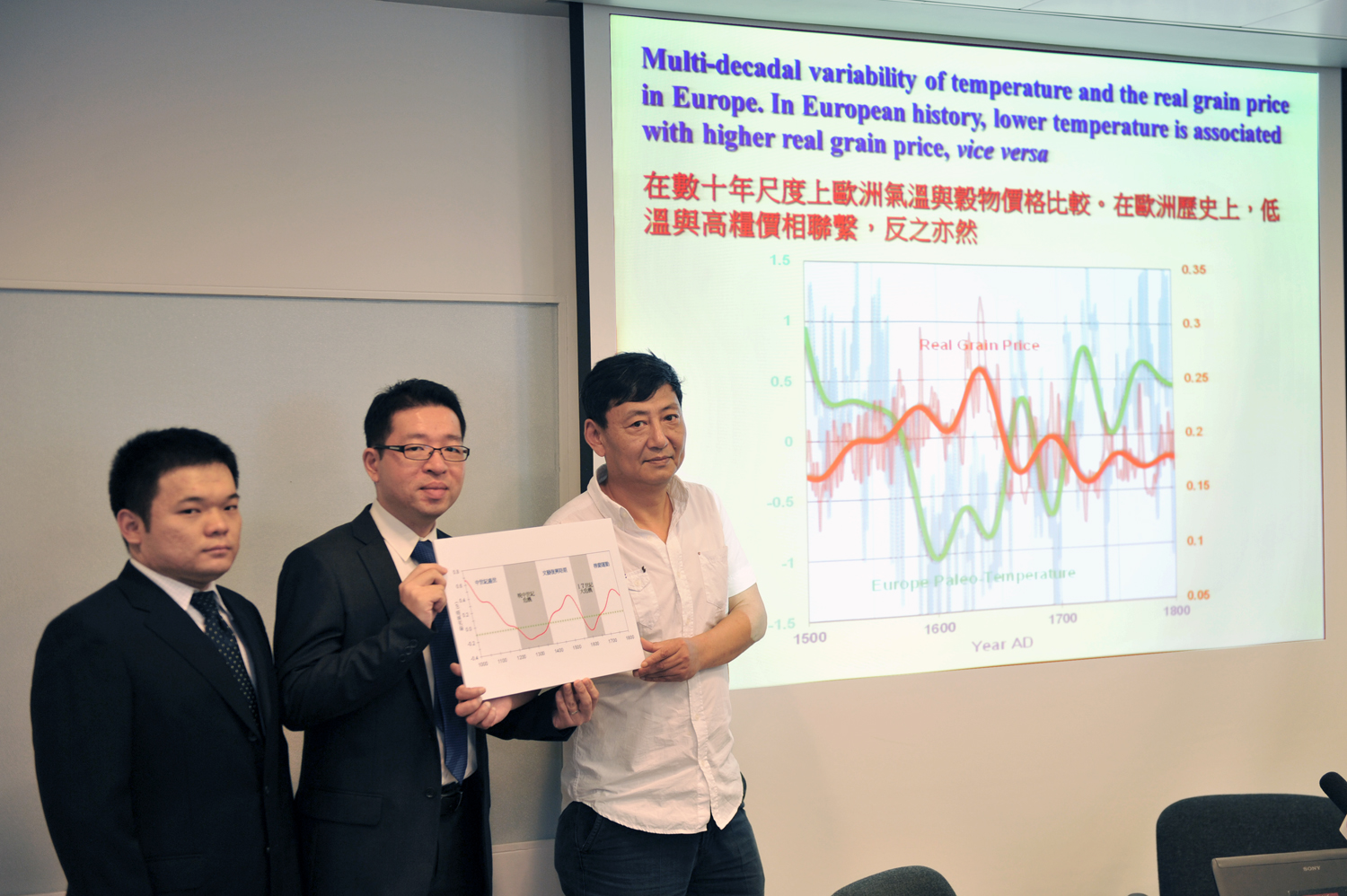Media
HKU research team finds climate change the ultimate cause of large-scale human crisis
04 Oct 2011
 |
| Professor David D. Zhang and his colleagues from the Department of Geography of HKU |
Climate change has been scientifically proven to be the ultimate cause of significant human crises in pre-industrial Europe and the Northern Hemisphere by Professor David D. Zhang and his colleagues from the Department of Geography of the University of Hong Kong (HKU).
The research finding is the first scientific verification about climate-crisis causal linkages. It will be published as the cover research story in the Proceedings of the National Academy of Sciences of the United States of America, the most prestigious journal in social sciences, on October 4 (Tuesday), Hong Kong time.
Prof. David D. Zhang and colleagues collected and tabulated all available historical data about climate, agro-ecology, economy, society, human ecology, and demography in pre-industrial Europe. Using various statistical methods, they established a set of causal linkages from climate change to human crisis. For example, a cold climate phase from 1560 to 1660 shortened plant-growing seasons and shrunk cultivated land area, which caused grain price increase by 300%. The downward spiral then continued, with famine becoming more frequent and human body height actually declining by 0.8 inches in the late 16th century. According to the authors, human height rose slowly with rising temperatures only after 1650. Agricultural and food supply changes happened soon after cooling periods, but five to 30 years after such climate events, social disturbance, wars, migrations, epidemics and other problems tended to erupt. All of the causal linkages between climate and ecological, social, economic and demographic crises in Europe have been verified in their study, which is also the first scientific verification about climate-crisis causal linkages.
The authors further identified that climate-driven grain price was the direct cause of conditions of harmony or crisis in before the industrial period because various social and human ecological crises (e.g., war, epidemics, famine, etc.) were directly triggered by high grain price (i.e., grain shortage). Furthermore, grain production was largely determined by temperature change. It is clearly shown that grain price was high when temperature was low, vice versa (Fig. 1). Given the above relationship, climate change was revealed to be the ultimate cause of the alternations of periods of harmony and crisis (Fig. 2). It was evident in Europe and the Northern Hemisphere.
The authors concluded that in the present days, for industrial and post-industrial societies, any natural or social factor that causes widespread depletion of livelihood resources, such as global climate and environmental change, over-population, over-consumption, or non-equitable distribution of resources may lead to large-scale human crisis due to a similar domino effect. The extent of the associated crisis will be largely contingent upon the degree of resource depletion and the effectiveness of advancing social buffering mechanisms, including social institutions at both international and national levels and social and technological developments.
Fig. 1. Multi-decadal variability of temperature and the real grain price in Europe. In European history, lower temperature is associated with higher real grain price, vice versa.
Fig. 2. Centennial variability of temperature and the alternation of golden and dark ages in Europe. Europe was in dark ages when temperature dropped below the threshold (i.e., σ < -0.1).
To read the article, please visit the Proceedings of the National Academy of Sciences of the United States of America website:
http://www.pnas.org/content/early/recent
HKU research team
- Professor David D. Zhang (Principal Investigator, Department of Geography, HKU)
- Dr Harry F. Lee (Department of Geography, HKU)
- Professor Cong Wang (Department of Finance, Jinan University)
- Professor Baosheng Li (Department of Geography, South China Normal University)
- Mr Qing Pei (Department of Geography, HKU)
- Ms Jane Zhang (South China Morning Post)
- Professor Yulun An (School of Geographic and Environmental Sciences, Guizhou Normal University)
For media enquiries, please contact: Ms Trinni Choy (Assistant Director (Media), Communications and Public Affairs Office) tel: 2859 2606, email: [email protected] or Ms Melanie Wan (Manager (Media), Communications and Public Affairs Office) tel: 2859 2600 email: [email protected].


